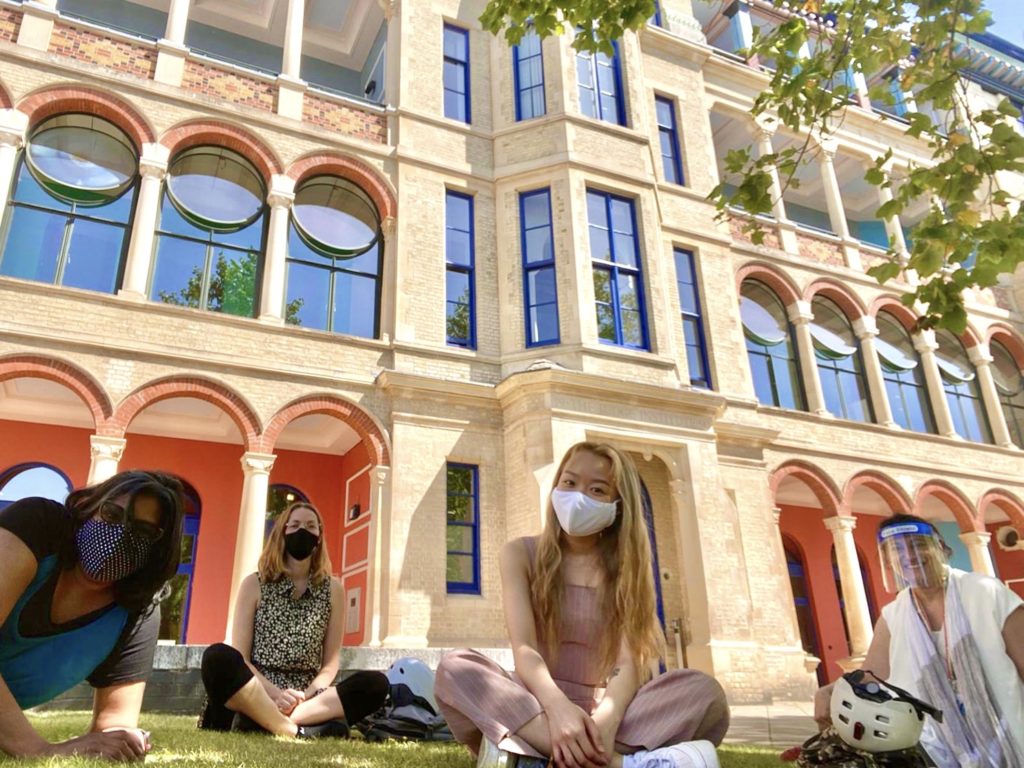Written by Emma Hoang, Engagement Assistant, Cambridge Centre for Social Innovation, and BSc Marketing & Management graduate of the University of Sussex.

“What do you want to do in the future?”
My primary motivation used to be salary and by no means I am the only one.
Now that I am graduating from university and en-route to the job market, I have been contemplating and reflecting on my values and what I want to achieve. This is where I realised my work at the Cambridge Centre for Social Innovation has shifted my mindset. Money is no longer my primary motivation: I am passionate about representing a business that is driven by purpose, rather than profit. I want to be socially conscious about the work I create, paving a path for future changemakers.
I am from Vietnam, a developing country with a rapid growth rate. Yet, to this day, there are social challenges within our community that call for disruptive thinking and practice. That is why the term ‘social entrepreneurship’ (and the like) has emerged in Vietnam as a strong current within the past decade. In my teen years, my mum would get me involved in programmes like Active Citizen, attempting to get me interested in tackling social issues; but, being a teenager, I only regarded it as something “good to know”.
Moving to the UK for university at the age of 18, my world was simple. It revolved only around me, without much attention paid to the outside world. I wanted to do great at university and find myself a well-paid job, leading to what I considered ‘a decent life’.
But I changed
My undergraduate degree gave me the option to do placement year. I worked as an Engagement Assistant at the Cambridge Centre for Social Innovation, Cambridge Judge Business School. The opportunity came to me like a gift from the heavens. Not only did I get the chance to do the work I love but also work as part of a dream team. That is not all: since I am responsible for the communications of the Centre across digital channels, I did a lot of research into the Centre’s work, social innovation as a field, and social issues worldwide. And I found a spark. The more research I did, the more interested I became. Each project I work on at the Centre gives me a lens into a different fragment of life, and the socially innovative work that deserves to be heard.
Social innovation, in the first instance, sounds distant; however, it is nearer to reality than I had initially imagined. Enzo Romero was born without his right hand. He now creates affordable prostheses to help the more than 12,000 people missing an upper arm in Peru; they are more often than not informal workers who’ve lost a limb due to an accident at work.
That is social innovation.
Sol Escobar witnessed a lack of support for her refugee friends in the UK. She now has her own clothing charity, empowering women refugees and promoting fashion sustainability. That is social innovation. It is the urge to tackle those “wicked problems” within our community and ultimately build a fairer world that social innovation was born [1]. The Centre’s co-directors, Professor Neil Stott and Professor Paul Tracey, defined social innovation as “a broad range of organizational and inter-organizational that is ostensibly designed to address the most deep-rooted ‘problems’ of society, such as poverty, inequality and environmental degradation” [2]. Putting it in simpler terms, it is to create and implement new solutions to social problems, which should benefit the social innovators and beyond.
Purpose makes profit
Fairly straightforward, right? But why is it so difficult for organisations to get involved? My assumption is profit.
With the rise in sustainability, we have seen many stories around ‘corporate greenwashing’ where companies use their communications and PR under the pretence that they are environmentally beneficial, in contradiction to their sustainability record. They hope to attract environmentally conscious customers to gain market share and a competitive advantage. A prime example is Ryanair’s advert in September 2019 that was banned by a UK watchdog in 2020. The advert claims that Ryanair has “the lowest carbon emissions of any major airline”, which according to the Advertising Standards Authority, is misleading and without substantial evidence [3]. Another example is Shell’s announcement in April 2019 that it would invest $300 million in ‘natural ecosystems’ as part of its CSR strategy [4]. However, by continuing the extraction of fossil fuels from the ground, they go against the mitigation efforts they promote. From shareholders’ perspectives, the price to become ‘greener’ and more ethical reduces their profits. This might not be true in the long-term considering that ‘true’ sustainability is of peak attention amongst all stakeholders. More effort needs to be made for companies to put purpose before profit.
It is not all gloom and doom. CDP, a not-for-profit charity considered as the gold standard of environmental reporting for corporates and regions, reported that 2020 saw a 59% increase in the number of companies disclosing their environmental impacts than the previous year [5]. This is a good sign because both social and environmental issues have gained the attention of organisations, which might have the biggest influence on what social innovation hopes to achieve – a sustainable future for all.
2020 was an eventful year
The pandemic has brought environmental issues as well as societal inequities to light. There have been numerous articles about how measures against the Coronavirus crisis have had mixed impacts on the environment [6]. On one hand, it significantly reduced greenhouse gas emissions and climate pollution thanks to the lockdowns. On the other hand, these short-term benefits will likely reverse when the world opens up again. Referring back to the speech made by Greta Thunberg in 2019 about the urgency of climate crisis, “I want you to act as if the house is on fire, because it is” [7], this unprecedented time should be considered as an opportunity for a close examination of humanity’s impact on the natural world. The pandemic also put social inequalities in the spotlight: it is apparent that COVID-19 hit each socio-economic status differently. For example, with schools moved online, there is evidence of a cavernous digital divide in less accessible communities, resulting in a generation receiving little to no impactful education. Along with the pandemic, we also saw the Black Lives Matter movement, where the destruction of racism was, once again, brought into sharp relief. Therefore, governments and organisations should reshape our unsustainable production and consumption systems, while promoting social justice and equity.
Witnessing how the pandemic shifted our world made me realise what I really want to stand up for, not only in my post-graduation journey but also in life. It is the desire to be part of a purpose-driven company and contribute to the wider movement of social innovation, tackling the “wicked problems”. And by no means, should I be the only one. Instead of asking companies about salary, we should ask them about their values and social responsibility strategy, and how they go about it. Instead of chasing big names with no clear commitment to giving back to the community, we should shed light on those that are more socially innovative and put purpose before profit.
It is your decision, but our future
I believe that this should be where companies stand out to attract young talent. It is their transparency in social commitments and business ethics that secures a sustainable future for both its stakeholders and the company itself. Shareholders might want profits quickly, but profits do not come if the company does not ‘walk the walk’.
I hope to inspire young people like me. Getting involved is easier than it seems. It does not have to be huge: start small by educating yourself on business ethics and sustainability or supporting the disadvantaged within your community. Little by little, we are building a fairer and more sustainable future for all. If we have tons of money but the world can no longer be recovered, what is the point of having it to begin with?




Leave a Reply